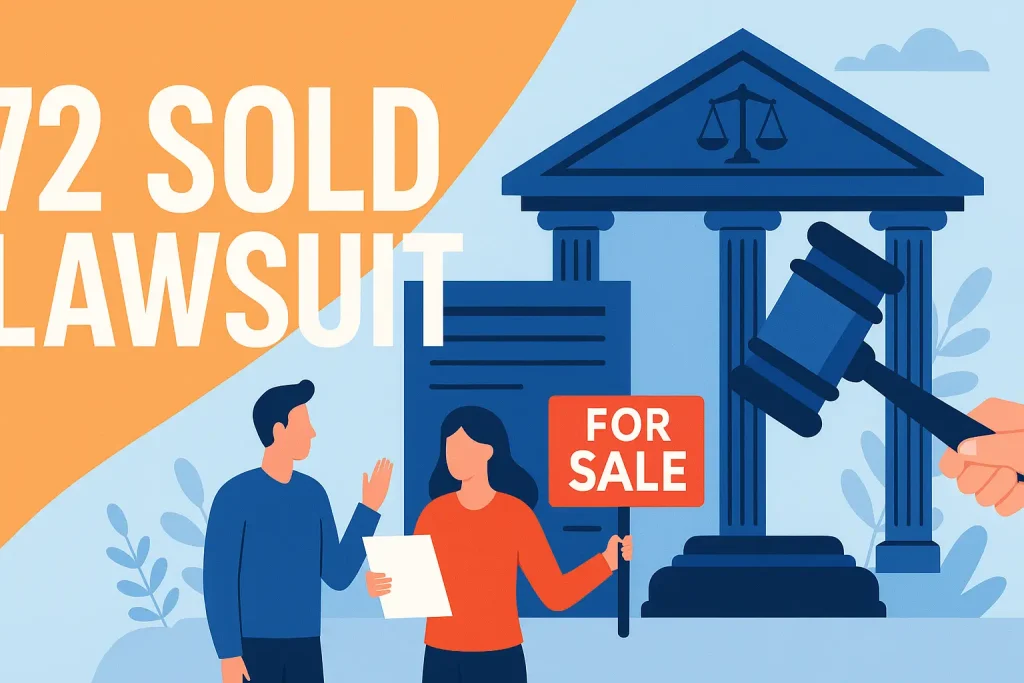
In the high-speed world of real estate, few companies have made waves like 72 Sold. With promises of selling homes in just 72 hours, it quickly gained national attention. However, in recent times, the spotlight has shifted due to a rising storm—the 72 Sold lawsuit. From false advertising allegations to disputes over home selling guarantees, this case has ignited debates across the country.
This article explores every angle of the 72 Sold real estate controversy—from the homeowners suing 72 Sold to the regulatory responses and the potential future of fast home sale companies. By the end, you’ll have clear insights into what happened, why it matters, and what it means for homeowners.
What is 72 Sold Lawsuit?
The lawsuit against 72 Sold centers around multiple claims, most notably deceptive advertising, misrepresentation, and alleged breach of contract. Filed in Arizona State Courts, the case has drawn national interest for questioning the integrity of real estate promises and platforms.
At its core, the lawsuit challenges the legality of marketing claims made by Greg Hague, the founder of 72 Sold, who built the brand on bold guarantees. The plaintiffs, mostly homeowners, argue that the 72-hour sale timeline and pricing promises were misleading, often leaving sellers with poor outcomes.
What Triggered the Lawsuit Against 72 Sold?
The tipping point came when multiple homeowners reported experiences that contradicted the company’s promises. They claimed their homes weren’t sold within the promised timeframe or fetched significantly lower prices than expected.
As word spread, reports reached the Arizona Real Estate Commission, prompting a deeper investigation. At the heart of the issue were aggressive marketing techniques and a growing number of complaints suggesting real estate fraud allegations and unethical practices.
Also Read: https://gossipsmag.co.uk/lessinvest-com-real-estate/
Core Allegations: False Advertising and Unrealistic Promises
The plaintiffs allege that 72 Sold’s advertising was not just misleading but intentionally designed to exploit emotional sellers. Promises like “get your home sold in 72 hours” were viewed as too good to be true—and often were.
Some sellers found that instead of quick sales, their homes sat on the market for weeks. Others were pressured into reducing their prices drastically. These claims raised questions about real estate misrepresentation and the legal boundaries of real estate marketing.
Breach of Contract Claims in the 72 Sold Legal Battle
Central to the case are breach of contract real estate claims. Plaintiffs argue that 72 Sold did not honor their contractual obligations, particularly around timing and pricing.
In several cases, home sellers were promised specific results but ended up in protracted listings with terms that deviated significantly from the original agreement. These inconsistencies have intensified the legal fire surrounding the brand.
Homeowners Speak Out: Personal Stories from the Lawsuit
Dozens of homeowners have come forward with similar tales. One Arizona family claimed they were promised a sale within 72 hours but waited over two months without results. Another seller shared how their home was undervalued by $50,000 due to aggressive discounting.
These stories reflect a larger narrative—that of broken trust. For many, the lawsuit is not just about lost money but about emotional disappointment and misplaced faith in a company that promised hope during uncertain times.
72 Sold’s Defense: What the Company Says in Response
72 Sold and Greg Hague have strongly denied any wrongdoing. In public statements, they assert that their program is not a guarantee, but a strategy that works for many clients and has consistently outperformed traditional models.
The defendants and legal team argue that consumer misunderstanding and selective negative experiences don’t reflect the broader success of their model. They emphasize transparency in contracts and claim that sellers were always informed of the potential risks.
Role of Real Estate Agents and Brokers in the 72 Sold Program
Real estate agents and brokers who partner with 72 Sold play a critical role in executing the 72-hour strategy. The lawsuit, however, has spotlighted concerns about training, accountability, and ethical standards.
Some agents claim they were pressured to push deals or bend the truth to meet the brand’s bold promises. Others say they were left without adequate support when deals went sideways, leading to tension between agents and the corporate model.
The Legal Proceedings Timeline: From Filing to Final Verdict
The legal process began in early 2023, with the first official filing in the State courts of Arizona. Since then, court hearings, investigations, and depositions have unfolded over months.
While no final 72 Sold settlement has been reached yet, sources close to the case suggest ongoing negotiations. A class action possibility has also emerged, indicating that more sellers may join in the near future.
Impact on the Real Estate Industry: Transparency and Regulation
- More scrutiny on advertising claims
- Stricter rules for home selling guarantees
- Improved agent accountability
- Growing demand for oversight
- Increased consumer education
The lawsuit has sparked regulatory bodies and watchdogs to act. Real estate regulation boards across the U.S. are reevaluating how marketing language should be monitored.
How the Lawsuit Affects Buyers, Sellers, and Future Homeowners
- Erosion of trust in fast-sale promises
- Rise in consumer research before selling
- New expectations for agent honesty
- Increased demand for written guarantees
- Boost in legal support options for sellers
This lawsuit has awakened many to the risks in real estate shortcuts. Sellers are now more cautious and buyers more skeptical. Transparency is becoming a must.
What This Lawsuit Means for Fast-Sale Real Estate Models
- Shift away from time-bound guarantees
- Higher demand for traditional agents
- Growth of hybrid service models
- Loss of credibility for unverified promises
- Potential end of “72-hour sale” claims
Quick-sale programs may need to rebrand. The trend now leans toward proven results rather than bold claims.
Regulatory Response: State Boards and Industry Oversight
- Arizona Real Estate Commission stepped in
- Other states launched inquiries
- Marketing Standards Authority issued warnings
- Training and licensing under review
- Push for industry-wide ethical codes
Regulators are now ensuring that no real estate company—regardless of scale—gets a free pass when it comes to homeowner legal rights.
Public Reactions and Media Coverage of the 72 Sold Lawsuit
From blogs to TV stations, the media has covered the 72 Sold lawsuit extensively. Consumer rights advocates and real estate analysts have offered mixed opinions, fueling public discourse.
Public sentiment is largely sympathetic toward sellers. On forums and social media, homeowners express outrage, disappointment, and a call for reform.
72 Sold’s Business Model Under Scrutiny: Is It Ethical?
Many now question whether the 72 Sold model was designed more for marketing appeal than actual results. The ethical debate hinges on whether it’s wrong to push a strategy that works only in ideal situations.
Critics argue the model lacks flexibility. Supporters say it brings innovation to a stale industry. Either way, scrutiny has intensified.
Comparison with Other Real Estate Selling Platforms
- Opendoor: tech-based, cash offers
- Redfin: discounted agent fees
- Zillow Offers (now defunct): instant buying
- RE/MAX Alliance: partnered with 72 Sold
- Traditional agencies: slower but often safer
Compared to others, 72 Sold relied heavily on bold guarantees, which now serve as both its selling point and Achilles’ heel.
Legal Precedents: Similar Cases That Shaped the Outcome
Past lawsuits in the real estate world—like those against Zillow and Redfin—have shown how marketing language can trigger legal fallout. These precedents may influence how the courts view 72 Sold’s actions.
Judges are now more inclined to protect consumers from manipulative promises, especially where real estate litigation is concerned.
Key Players Involved in the Lawsuit and Their Statements
- Greg Hague: maintains innocence, defends strategy
- Homeowners/Plaintiffs: share emotional losses
- Arizona Real Estate Commission: calls for ethical reform
- Legal team: split between contract interpretation and intent
- Media: amplifies public sentiment
Each stakeholder’s stance adds a layer to this complex legal and ethical saga.
Expert Opinions: Lawyers and Industry Analysts Weigh In
Legal professionals argue that while the case may not end in massive damages, it could redefine contract clarity in real estate. Analysts say this may lead to industry-wide policy shifts.
Some experts warn that too much regulation could stifle innovation, but others insist ethical marketing must become the norm.
Consumer Protection and Your Rights When Selling a Home
Sellers are entitled to transparency, honest representation, and clear contracts. If promises go unmet, legal remedies exist.
This case has empowered consumers to read the fine print, ask more questions, and document every step in their home-selling journey.
Lessons Learned from the 72 Sold Lawsuit
Transparency isn’t optional. Neither is honesty. The biggest lesson? Real estate is personal—and missteps affect lives.
Companies must balance innovation with integrity. And consumers must always protect their own interests.
What the Final Verdict Means for Real Estate Marketing Claims
The final outcome will likely set legal and ethical standards for years to come. Companies will be forced to rethink bold promises.
Expect a wave of disclaimers, revised contracts, and more conservative messaging in real estate ads.
Future of 72 Sold: Can the Company Rebuild Trust?
With its reputation shaken, 72 Sold faces a tough road ahead. Yet, by accepting accountability and improving practices, it may still thrive.
The public loves a comeback story—if the company proves it’s serious about change.
How to Protect Yourself from Real Estate Scams
- Always read the contract carefully
- Research the company beforehand
- Ask for a written timeline and pricing plan
- Verify agent licenses
- Use a real estate attorney for big decisions
Did 72 Sold Violate Real Estate Laws or Just Push the Limits?
That’s for the courts to decide. But the case walks a fine line between innovation and manipulation.
While not yet proven illegal, many of their tactics stretched the ethical boundaries of real estate practices.
Transparency in Real Estate: A New Era Post-Lawsuit?
This lawsuit may mark a turning point. Consumers are demanding clarity, regulators are listening, and companies must now evolve.
We are likely entering a new era of transparent, ethical, and regulated real estate transactions.
Can Homeowners Sue Real Estate Companies? Here’s How
- Document all communications
- Gather promotional materials
- Seek legal consultation early
- File through small claims or state courts
- Consider joining class action cases
Is This the End of the ‘Sell Your Home in 72 Hours’ Model?
Perhaps. Bold timelines may become marketing relics, replaced by realistic expectations and trust-building.
Still, innovation in real estate isn’t dead. It’s simply evolving.
72 Sold Lawsuit FAQs: What Every Seller Needs to Know
Q: Is 72 Sold still operational?
A: Yes, but under heightened scrutiny.
Q: Can I join the lawsuit?
A: Consult with a real estate attorney in your state.
Q: Will 72-hour sales still be promoted?
A: Likely with heavy disclaimers or modified terms.
Final Thoughts
The 72 Sold lawsuit is more than a legal case—it’s a wake-up call. It challenges how we view real estate promises, trust in marketing, and the ethics of entrepreneurship.
For homeowners, it’s a reminder: always do your homework. For real estate companies, it’s a mandate: put truth before hype. Trust is the new currency—and in this market, it’s priceless.

